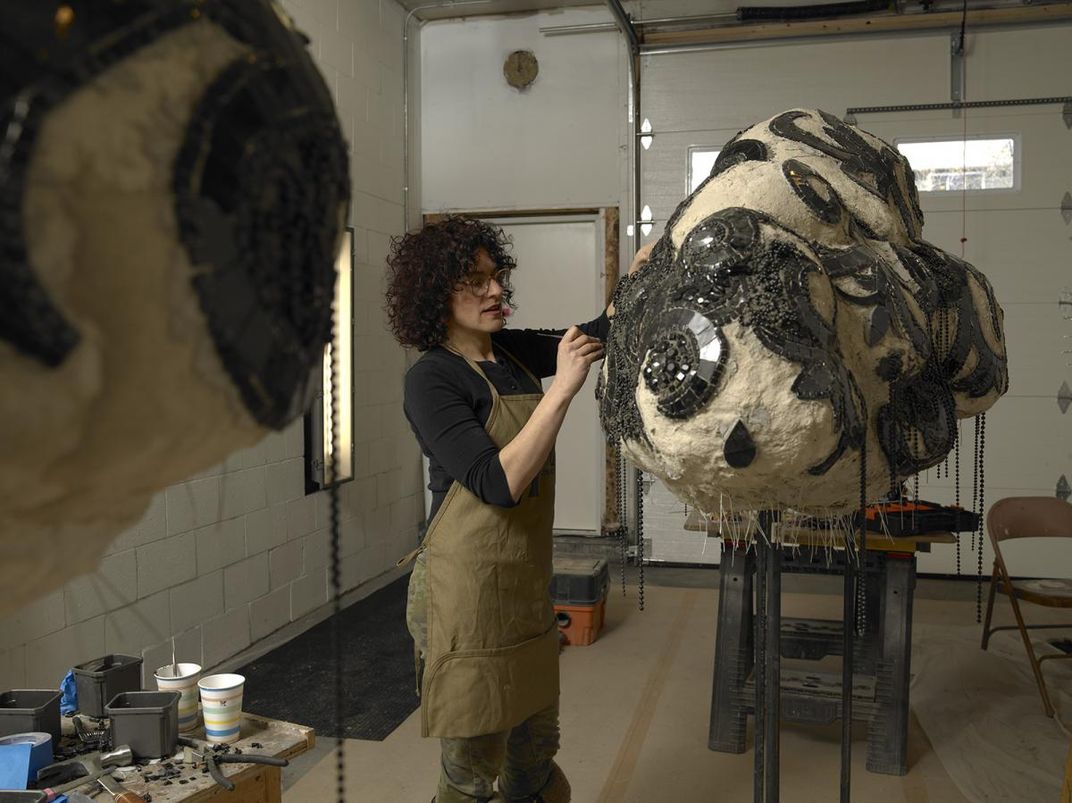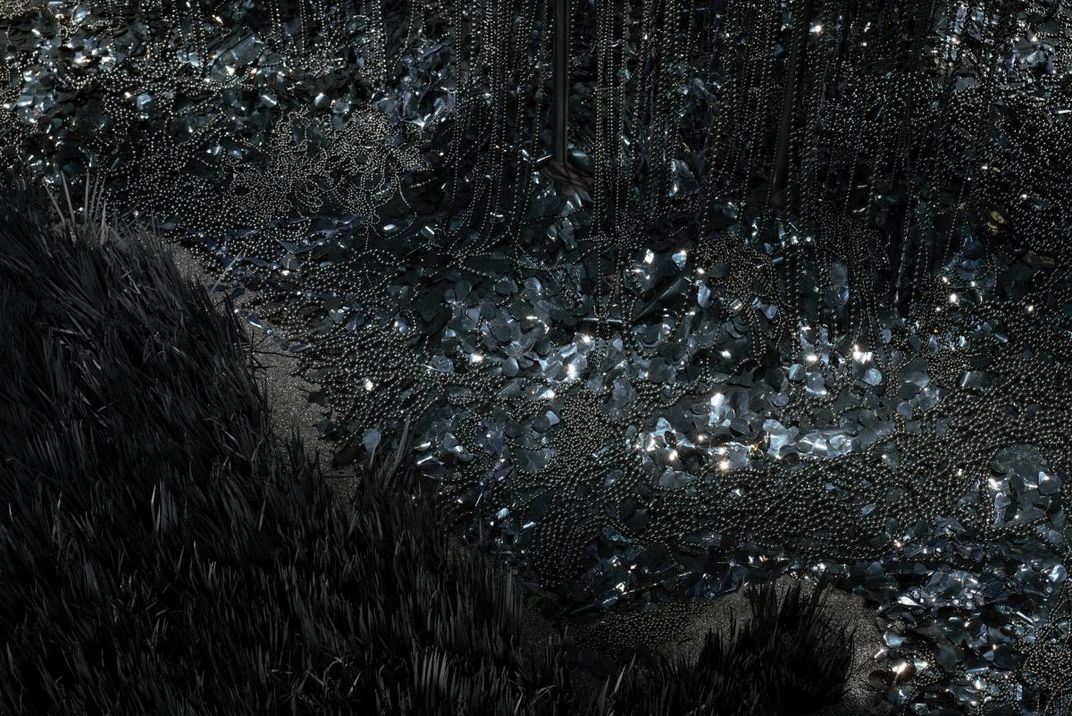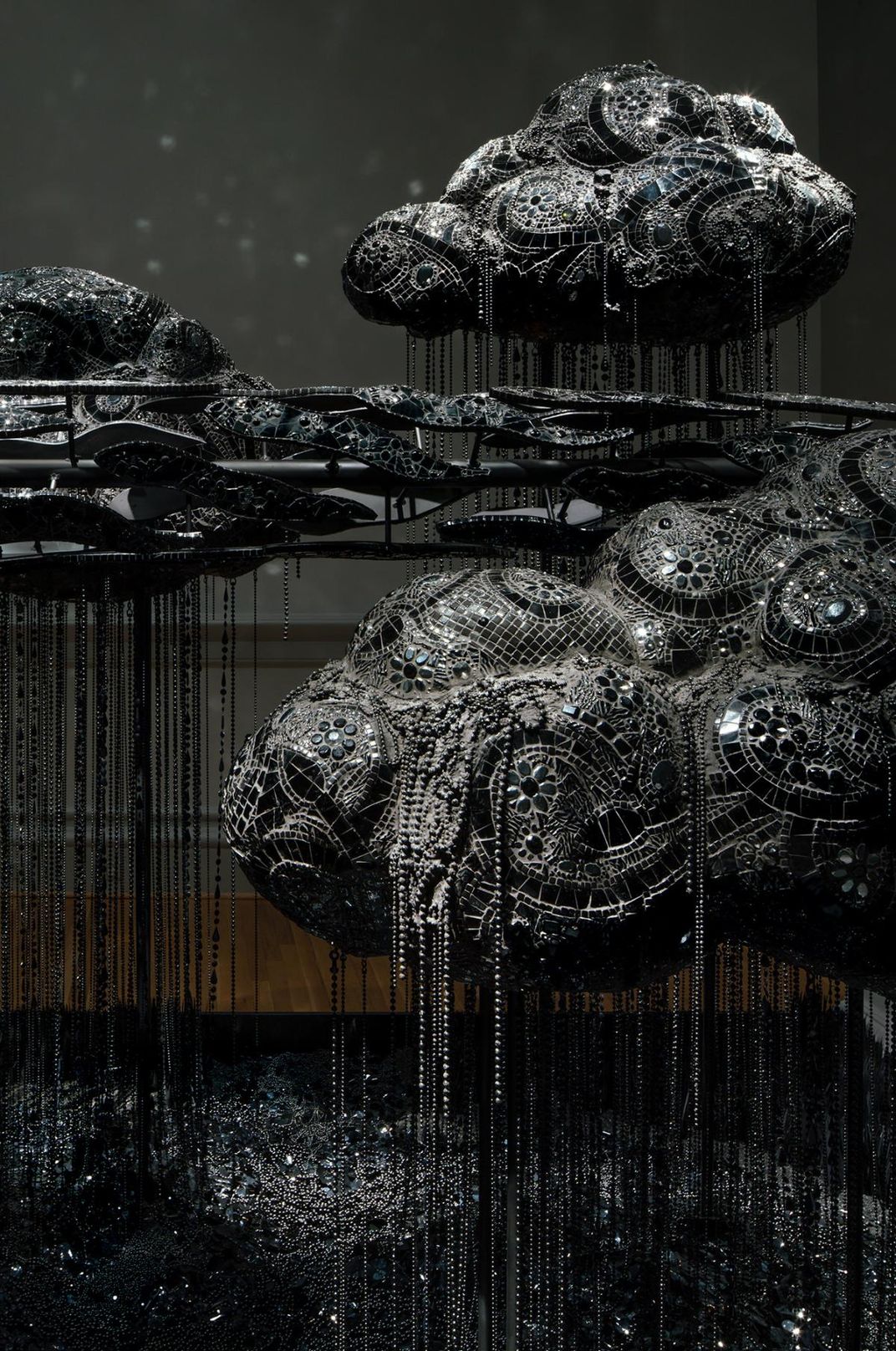SMITHSONIAN AMERICAN ART MUSEUM AND THE RENWICK GALLERY
Lauren Fensterstock in Focus: Finding Inspiration in the End of the World
New artwork explores how weather and celestial activity have been used as metaphor
:focal(600x414:601x415)/https://tf-cmsv2-smithsonianmag-media.s3.amazonaws.com/blogging/featured/Fensterstock-01.jpg)
Lauren Fensterstock, The totality of time lusters the dusk, 2020, glass, Swarovski crystal, quartz, obsidian, onyx, hematite, paper, Plexiglas, wood, cement, lath, and mixed media, dimensions variable, (Courtesy Claire Oliver Gallery. Photo by Ron Blunt)
Lauren Fensterstock is one of four contemporary artists featured in Forces of Nature: Renwick Invitational 2020, the latest exhibition at SAAM’s Renwick Gallery (currently closed to the public temporarily due to the COVID-19 pandemic). The Renwick Invitational is a biennial juried showcase for midcareer and emerging craft artists who deserve wider recognition. The makers selected for the exhibition—Timothy Horn, Debora Moore, and Rowland Ricketts in addition to Lauren Fensterstock—explore how craft’s complex relationship with the natural world helps us understand our place in the order of things. This feels especially important right now during a transformative global pandemic, when nature can provide us necessary refuge, understanding, and hope. It also exposes a shared resilience. The cycles remain—spring turns to summer, summer turns to fall—and we, too, find ways to move forward, even imperfectly.
Fensterstock’s current practice places her in the role of unconventional landscape architect. While designing the garden at her home in Portland, Maine more than a decade ago, Fensterstock began researching garden history and discovered the variety of ways humans have manipulated the natural world to express their own culture, views, and values. Craft enables her to explore ecology—the study of relationships that form between organisms and their environment—in its truest sense.

Lauren Fensterstock working on a cloud for The totality of time lusters the dusk.
Photo by Luc DemersFor the Invitational, SAAM commissioned a new site-specific work that transforms an entire gallery at the Renwick into earthly and heavenly realms. The totality of time lusters the dusk (2020) is largely constructed in monochromatic black—a choice that speaks to Fensterstock’s diverse influences, which range from twentieth-century minimalism to the Claude glass, a seventeenth-century drawing tool named for painter Claude Lorraine. Her landscapes express at once a void and the entire world and invite us to take a closer look. Rain clouds and a comet, complete with streaming tail, hover over a richly detailed garden. Fensterstock encrusts the objects that make up this glittering, yet ominous, skyscape with a dazzling mosaic of obsidian, glass, and crystals. She harnesses these elements to refer to scrying, a practice that uses dark reflective surfaces to see visions of the future.

Lauren Fensterstock, The totality of time lusters the dusk, 2020, glass, Swarovski crystal, quartz, obsidian, onyx, hematite, paper, Plexiglas, wood, cement, lath, and mixed media, dimensions variable
Courtesy Claire Oliver Gallery. Photo by Ron BluntThe installation is the first in a new series for the artist inspired by sources like The Book of Miracles, a richly illustrated sixteenth-century German manuscript. It belongs to a larger category of apocalyptic albums, a type of publication that became popular as more and more people began reading the Bible in the wake of the development of the printing press. The Book of Miracles details a wide range of events marked by extreme natural conditions, believed to be the result of divine intervention: the deluge that necessitated Noah’s ark, plagues of locusts, skies with multiple suns, stars falling from heaven, snow in summer. One image—a fiery comet appearing at the time of Muhammad’s birth over the city of Constantinople—serves as a key reference for The totality of time lusters the dusk.

Lauren Fensterstock, The totality of time lusters the dusk, 2020, glass, Swarovski crystal, quartz, obsidian, onyx, hematite, paper, Plexiglas, wood, cement, lath, and mixed media, dimensions variable
Courtesy Claire Oliver Gallery. Photo by Ron BluntThe totality of time lusters the dusk is Fensterstock’s first work to explore how weather and celestial activity have been used as metaphor, an especially potent idea in our current age of extreme weather and changing climate amid a devastating global pandemic. Although this new direction came before the appearance of the 2019 coronavirus, the foreboding and destabilizing beauty of Fensterstock’s work takes on additional meaning in a reality where the myth of certainty has been exposed as fallible.
Hear more from Fensterstock in the artist video on SAAM’s website and see more images of her work in our online gallery.
